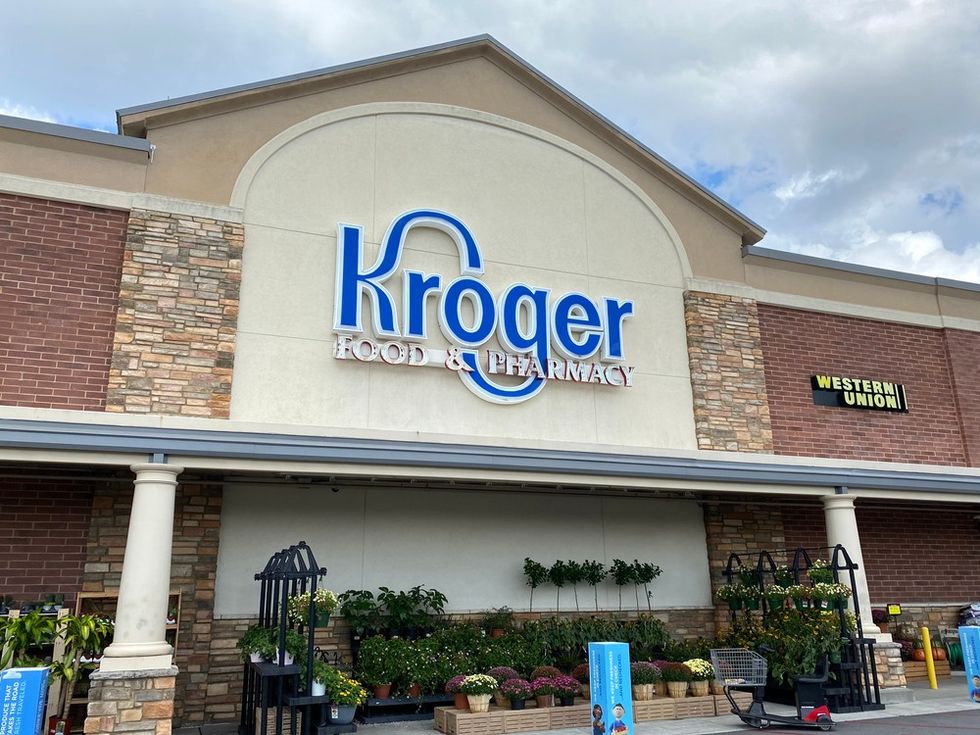Grocery chain Kroger is in hot water after a new report dropped a bombshell, accusing the brand of overcharging customers with expired sale tags and pricing discrepancies. A new investigation by Consumer Reports, The Guardian, and the Food & Environment Reporting Network (FERN) uncovered pricing discrepancies at over half of the 26 Kroger and Kroger-owned grocery stores they audited across 14 states and Washington, D.C.
Here’s what the report found, how you may have been overcharged if you shop at Kroger, and what you can do to make sure these scams—whether intentional or not—don’t fool you again.
RELATED: Shoppers Threaten to Boycott Kroger Over “Price Gouging” and Switch to Aldi
Kroger Accused of Overcharging Customers in New Report
Kroger is one of America’s largest grocers with over 2,700 stores under different brand names, such as Harris Teeter, Fred Meyer, Fry’s, and Ralphs. It’s also booming, with an operating profit last fiscal year of $3.85 billion.
However, after being tipped off by Kroger employees in Colorado that some shady overcharging practices due to price tag errors are happening—which the company allegedly knows about—Consumer Reports (CR), The Guardian, and FERN launched an undercover investigation.
“To document the size and breadth of the problem, we recruited people to shop at 26 Kroger and Kroger-owned stores, including Harris Teeter, Fred Meyer, Fry’s, and Ralphs, in 14 states and the District of Columbia in March, April, and May,” CR wrote.
The results were alarming:
“The shoppers found expired sales labels that led to overcharges on more than 150 grocery items, including Cheerios cereal, Mucinex cold and flu medication, Nescafé instant coffee, boneless beef, salmon, and dog food. One-third of the expired sales tags were out of date by at least 10 days, and the prices of five of the products were expired by at least 90 days. The average overcharge we found was $1.70 per item, or 18.4 percent. Our findings suggest the typical Kroger shopper ends up paying far more for what they think are discounted items—all during a time of inflation and economic uncertainty.” – Consumer Reports
Lawyers who CR enlisted to review the findings called the duration and scale of these price tag errors to be “deeply concerning.” And customers are outraged that they’re spending about $1.70 or more for items that are being advertised on shelves for less.
In fact, this investigation was also inspired by multiple class-action lawsuits filed against Kroger in recent years. Grocery shoppers in the states of California, Illinois, Ohio, and Utah have all come forward to accuse the company of pricing errors.
RELATED: 6 Secrets Kroger Doesn’t Want You to Know
Kroger Denies Investigation Findings
In response to the new report, a Kroger representative told CR, “While any error is unacceptable, the characterization of widespread pricing concerns is patently false.”
The spokesperson also claimed that the investigation was too small to be substantial, offering only a “few dozen examples across several years out of billions of customer transactions annually.”
In defense, they said Kroger is “committed to affordable and accurate pricing” and it reviews “millions of items weekly to ensure our shelf prices are accurate.”
Still, CR’s report suggests staffing shortages at Kroger-owned locations may be contributing to the issue and causing sticker prices to be neglected. For instance, at the locations the investigations took place, there has been a 10% decline in employees and a 9.3% average reduction in hours worked per store since 2019.
Plus, grocery shoppers told CR that when they have complained to store management about price discrepancies between what the shelf label and cash register says, the response is that the Kroger employees “didn’t have the staff to keep the shelf tags up to date.”
The Colorado employees back these claims up with first-hand experiences of their own.
However, Kroger is denying it has a staffing problem, telling CR that they “intentionally staff our stores to keep them running smoothly while creating an enjoyable place to shop. Our staffing decisions are data-driven to balance workload and schedules.”
How to Avoid Paying More for Grocery Items
The report by CR, The Guardian, and FERN cited mounting evidence that some locations of Kroger stores are worse at price tag errors than others, and that Kroger isn’t the only grocer who’s at fault—citing recent lawsuits against brands like Walmart, Safeway, Albertsons, Vons, and some dollar stores for the same issues.
So, it’s important to protect your wallet and pay attention when doing your weekly grocery shopping.
Experts suggest making sure you’re paying the right price on any foods or essential household items by following these tips:
- Speak up: Alert store employees when you spot outdated pricing.
- Use self-checkout smartly: Scan slowly and watch item totals.
- Double-check your receipt: Compare shelf tags to what you paid.
- Know store policies: Many retailers offer to refund the difference—or more—if you’re overcharged. Kroger, for its part, has a “Make It Right” policy, where you can ask for a refund or price adjustment in person, online, or over the phone.
In the meantime, Kroger seems to be intending to fix widespread price tag errors by testing digital tags and other solutions, CR reports. But for now, the best method may be looking out for your own grocery bill and double-checking every item’s price.
Content shared from bestlifeonline.com.

